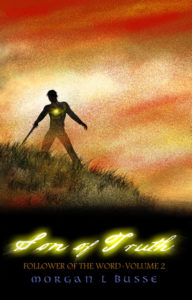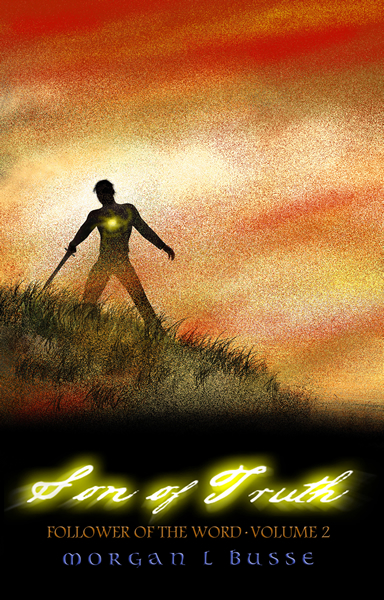‘Son Of Truth’: Sometimes The Worst Things Have Purpose
 For almost the past year now, I have eagerly looked forward to Son of Truth, sequel to Daughter of Light. The trilogy by author Morgan L. Busse consists of these two aforementioned novels, and the third book soon to come. The series is called Follower of the Word, after the group of heroes who worship and, well, “follow” the One, True God, called in-universe, the Word.
For almost the past year now, I have eagerly looked forward to Son of Truth, sequel to Daughter of Light. The trilogy by author Morgan L. Busse consists of these two aforementioned novels, and the third book soon to come. The series is called Follower of the Word, after the group of heroes who worship and, well, “follow” the One, True God, called in-universe, the Word.
This story begins right where the previous book left off. The Temanin forces have been defeated, and the White City is saved. Moreover, this occurred when the Word used the Eldaran, Rowen Mar, to force Temanin prince and assassin, Caleb Tala, to face the darkness within himself. This served two purposes for the Word and mankind. The Word raised up a new champion, and the Word chose to use Rowen as the conduit through which to unleash His power to destroy the Temanin army.
As the story begins, Nierne, the scribe who fled the Shadonae in the previous book, is nearing her goal of enlisting the help of an Eldaran, Rowen is recovering but under suspicion of those who view her as a witch, and Caleb is a broken man, fearing the ghosts of those he murdered, and sure he is on the way to a hell of his own making.
For a short time, things seem to be looking up. Nierne meets Rowen and sets out with her for Thyra to fight the Shadonae, Caleb is forgiven and remade into the service of the Word, and Lore Palancar plans to head off to join the woman he loves, our heroine Rowen.
Then things go horribly, horribly wrong. Betrayal from all corners sets in, and Nierne, Rowen, and Lore find their lives thrown into even more chaos. Caleb, now christened “The Son of Truth” by the Word, and intent on finding out more about his lineage and duties to the Word, may be the only hope of saving these three and the rest of the Lands.
I recently described this book as The Empire Strikes Back meets Christian fantasy, and I think that description fits. This book is not at all cheery. The good guys really get beaten, demoralized, and bloodied up during the course of the book. Worse yet, only in the last fifth of the book is this from the actual main villains of the trilogy. For the most part, this adversity comes from other sources that cause immense pain and heartache for our heroes. In a way, this made sense to me. This isn’t the absurdity of the Star Wars prequel trilogy where everything down to a Padawan losing their lightsaber or getting a paper cut is due to the machinations of the Sith. This is more real to life in that both the good and the bad guys have things outside of their control.
I will give a caveat to the above, however, when it comes to the tone of the novel. The book was very dark at times, yes. All the same, Busse did sort of give respites with small scenes and plot points that suggested the happier resolution still to come in the final book when it is written. She also put in some breathing room between the darkest scenes, so that the book was still an enjoyable adventure, and not depressing.
I said a moment ago that “the good and the bad guys” both are unable to completely control the situation. This does not hold true, however, for the Word. It seems that there are a few themes in this book. These themes are the keeping of faith (or regaining faith, in the case of Nierne) in the midst of suffering, trust in God, and the fact that all things are ordained and part of God’s plans. In the book, these themes are brought to the readers attention via the relationships of the characters with the Word. Nierne loses her faith outright for a time. She is broken, battered, and emotionally and spiritually destroyed during the story. Only the vestiges of her faith that she is unable to completely relinquish keep her from being completely ruined. Rowen doesn’t lose her faith, but she does come close to losing her trust in the Word. After all, He brought her to the point she is in the story, and she can’t understand why.
Then there is Caleb, who is the lynchpin of the tale. Everything revolves around him, even when he is not present. Caleb’s character arc also, interestingly enough, brings to the fore the final theme I noticed, that of God’s pre-ordaining and planning all things. Caleb is, in a way, the reason all the bad things have gone wrong, because Rowen can not defeat the Shadonae after all, at least not alone. Caleb is the Eldaran with the powers from the Word most suited to this purpose. That is how he is the “cause” of the bad things in this book – the Word is directing things to have our heroes’ paths cross that of this young former assassin. Oh sure, the Word could use Rowen to release His power and destroy the Shadonae as He did with the Temanin army at the climax of Daughter, or He could just destroy them with no human conduit at all, but He will not do so. He has larger plans that include destroying more evil, and leading to more converts.
Finally, I wanted to discuss some of the characters. First of all would be Lore Palancar and Caleb Tala. They represent, in many ways, the same basic character archetype of the Paladin, the noble Knight or warrior who defends the weak. They simply have a very different way of going about it, and are at different points in their lives spiritually and morally. Lore is much wiser and more stable in his faith. His control over this thoughts, actions, and desires is much stronger than that of Caleb. Caleb is more fiery, fierce, and a far better fighter. Militarily, Lore is the natural leader of men, whereas Caleb is a loner.
This dynamic I just described was interesting to me because it shows an important truth. God can change our lives if we turn them over to Him, but He doesn’t make things suddenly “easier” for us. He doesn’t take away our urges and desires. The Word of God makes this clear, actually, when it speaks of “mortifying” the sins with which we struggle. In the first book, Lore struggles with the his growing attraction and love for Rowen creating impure thoughts. In this book, the Big Bads actually play on Caleb’s much more developed and habitual “sins of the flesh,” so to speak.
I found myself able to relate to this struggle. I am a guy. I find women attractive. I struggle at times not to feel lust for them, not to commit adultery in my heart with them. I win the battle far more often than I should because GOD wins the battles for me, just as the Word did for Lore and Caleb, and even Nierne to be honest, eventually. I must say that I was a little surprised, because most women do not understand these struggles that men deal with, at least in my experience they don’t. Yet the author seemed to understand and communicate well the struggles. This was very edifying for me, as too many Christian books portray God as just instantly clearing away all bad desires. He doesn’t do this, and He never promised to do so. But He does promise to help us deal with them better, and daily defeat them, as the Word does in this tale.
Nierne and Rowen definitely suffered far more than the men did in this book, but that is also why I found their story arcs to be so interesting and edifying as well. They doubt, they rage, they (in the case of Nierne) have their faith absolutely obliterated for a time. This is real, with none of the “easy faith” prominent in so much Christian fiction, or the “getting over yourself” for which secular fiction is known. The realism of their struggles make their keeping and regaining their faith all the more satisfying.
Son of Truth was a phenomenal read that continued the great work Busse did with Daughter before it. The history and abilities of the Eldarans were delved into a little more, and the action scenes, and spiritual and physical conflicts, were presented very true to life. It was a little light, as I said, on the exact villains until almost four-fifths of the way through, but once they come into the tale again, it is something to behold.
This was a compelling and edifying read, and I can’t wait for the conclusion to come out.
Highly Recommended.





























Share your fantastical thoughts.